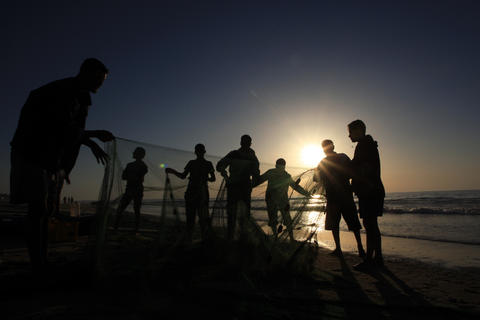 Gaza fishermen preparing nets. Fishing by Gazans now a “hazardous occupation”.
Gaza fishermen preparing nets. Fishing by Gazans now a “hazardous occupation”.
Restrictions placed on Gaza fishermen by Israeli naval vessels has made living from the sea an almost impossible occupation these days. This fact goes along with decreasing fish catches in the Mediterranean due to over fishing, increasing sea pollution from sewage, plastic material and other forms of garbage, and increasing numbers of unwanted pests such as jellyfish, now being attributed to global warming. As a result, one Gaza marine engineer and sea captain, Sohail Ekhail , has been trying to provide his fellow Palestinians with nourishing fish by operating a fish farm on the outskirts of Gaza City.
Ekhail is considered as a pioneer in raising fish in salt water pools in Gaza to produce fish which are of a much better quality than fish that are still managing to be caught at sea under the three mile limit that is restricted to Gaza fishermen by Israel.
In his 6 small pools, Ekhail is able to raise fish such as grey and red tilapia, known commonly as “moosht” by locals and “Amnon” or St. Peter’s fish by Israelis who also engage in widespread fish farming for species such as tilapia, grey mullet, and carp.
Ekhail’s aquaculture operations have not been without a number of problems however. His fish farm was destroyed by Israeli ground forces during the three week Operation Cast Lead military operation in 2008-2009. After restarting the fish farm later on, he has had to contend with occasional electricity power shortages that cause problems to the aeration equipment used to provide oxygen to the fish ponds, as well as not always being able to get the fish pellets needed to feed his fish.
Another issue is the cost of the fish themselves, which go for around NS 25 ($8) per kilogram, making them not affordable by many Gazans who have to live on handouts from UN organizations.
In an interview with the IPS news site , Ekhail mentioned some of his problems:
“We sell mainly to restaurants because people can’t afford to pay for our fish. Many customers buy frozen fish from Egypt instead of ours, because it’s cheaper. And the pellets we feed the fish come from Israel. They are often delayed.”
Frozen fish are “imported” from Egypt through the series of underground tunnels from where Gazans receive much of their goods. The frozen fish is less expensive than those from Ekhail’s fish farm although the quality is not as good.
Gaza has a long history of dependence on the sea for food. Some 4,000 Gazans still try to fish in the sea for a living; even though their annual fish catch has from a former 3,500 tons a year to only around 500 tons.
Their efforts to go out to fish, even in the three mile zone restricted to them are met with all types of resistance from Israeli naval vessels who do everything from spraying the fishermen with foul smelling substances from water cannon, to actual gunfire and even capture by patrol boats.
For people living on Food Aid handouts Ekhail’s fresh fish, although of excellent quality, are just not within the economic reach of most Gazans. But at least the idea of the aqua farm itself indicates that if allowed to do so, operations like fish farms are possible in over-populated Gaza.
Fish Pond Photo credit: Eva Bartlet/IPS News
Read more on fish farming and Mediterranean fishing issues:
Fish farming Isn’t so Evil After All
Jellyfish Attack on Israeli Power Plant a Clear Sign of Global Warming?
Is the Mediterranean Sea Harboring a Giant Plastic Garbage Patch?
Commercial Fishing in the Mediterranean Endangering Dolphins?

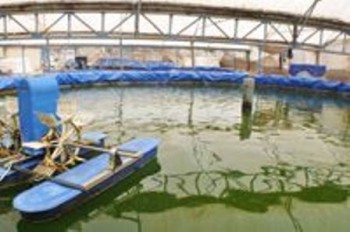
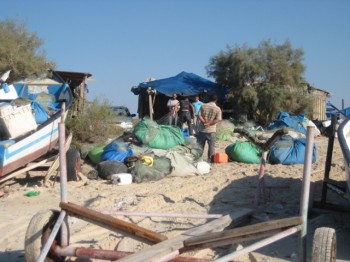
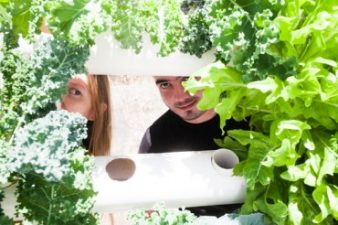
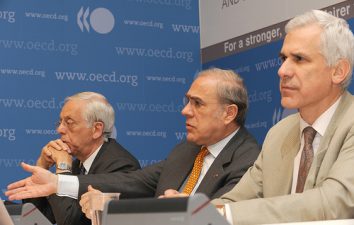

What kind of a commment is that Tom??? Very unfair and not in the least bit accurate.
Awesome. We have found at least one person in Gaza who is interested in doing something constructive instead of something destructive. Maybe he will be an inspiration to another one, or 2, o even more gazans.